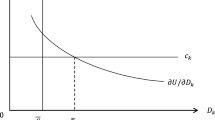Abstract
This paper examines the question of whether reputational capital can deter opportunistic behavior among legislators preparing to exit the House of Representatives. I create a measure of reputational trustworthiness, based upon pooled samples of constituency opinion derived from the National Election Studies surveys. I then examine the extent to which such reputational good will among constituents deters lame-duck foreign travel by exiting House incumbents within the context of a quasi-experimental research design. The analysis suggests that legislators may be ‘self-policed’ by their reputations for honesty and trustworthiness to the point of discouraging unethical activity. urveys. I then examine the extent to which such s derived from the National Election Studies
Similar content being viewed by others
References
Akerlof, G.H. (1970). The market for ‘lemons’: Quality uncertainty and the market mechanism. Quarterly Journal of Economics 74:488–500
Alchian, A.A. and Demsetz, H. (1972). Production, information costs, and economic organization. American Economic Review 62:777–795
Barro, R.J. (1973). The control of politicians: An economic model. Public Choice 14:19–42
Becker, G.S. and Stigler, G.J. (1974). Law enforcement, malfeasance, and the compensation of enforcers. Journal of Legal Studies 3:1–18
Commission on Administrative Review, U.S. House of Representatives. (1977). Final report, 95th Congress, 1st session, H. Doc. 95–272.
Cook, T.D. and Campbell, D.T. (1979). Quasi-experimentation. Boston: Houghton Mifflin.
Crain, W., Leavans, D.R. and Tollison, R.D. (1986). Final voting in legislatures. American Economic Review 76:833–841
Davis, M.L., and Ferrantino, M. (1996). Towards a positive theory of political rhetoric: Why do politicians lie? Public Choice 88:1–13
Dougan, W.R. and Munger, M.C. (1989). The rationality of ideology. Journal of Law and Economics 32:119–142
Fama, E.F. and Jensen, M.C. (1983). Agency problems and residual claims. Journal of Law and Economics 26:327–349
Fenno, R.F. Jr., (1973). Congressmen in committees. Boston: Little, Brown.
Ferejohn, J. (1986). Incumbent performance and electoral control. Public Choice 50:5–25
Figlio, D.W. (2000). Political shirking, opponent quality, and electoral support. Public Choice 103:271–284
Fiorina, M.P. (1977). Congress: Keystone of the Washington establishment. New Haven: Yale University Press.
Goldenberg, E.N. and Traugott, M.W. (1984). Campaigning for Congress. Washington: Congressional Quarterly Press.
Goodrich, L.J. (1998). Congress gets an ‘a’ for voter participation. The Christian Science Monitor, January 29. http://search.csmonitor.com/durable/1998/01/29/us/us.5.html (Sept. 26, 2003).
Jensen, M.C. and Meckling, W.H. (1976). Theory of the firm: Managerial behavior, agency costs, and ownership structure. Journal of Financial Economics 3:305–360
Kalt, J.P. and Zupan, M.A. (1990). The apparent ideological behavior of legislatures: Testing for principal-agent slack in political institutions. Journal of Law and Economics 33:103–131
Kalt, J.P. and Zupan, M.A. (1984). Capture and ideology in the economic theory of politics. American Economic Review 74:279–300
Kau, J.B. and Rubin, P.H. (1979). Self-interest, ideology, and logrolling in congressional voting. Journal of Law and Economics 22:365–384
Klein, B. and Leffler, K.B. (1981). The role of market forces in assuring contractual performance. Journal of Political Economy 89:615–641
Klein, B., Crawford, R.G. and Alchian, A.A. (1978). Vertical integration, appropriable rents, and the competitive contracting process. Journal of Law and Economics 21:297–326
Korin, B.P. (1975). Statistical concepts for the social sciences. Cambridge: Winthrop Publishers. and models.
Lott, J.R. (1990). Attendance rates, political shirking, and the effect of post-elective office employment. Economic Inquiry 28:133–150.
Lott, J.R. (1987). Political cheating. Public Choice 74:461–484.
Lott, JR. (1986). Brand names and barriers to entry in political markets. Public Choice 51:87–92.
Lott, J.R. and Davis, M. (1992). A critical review and an extension of the political shirking literature. Public Choice 74:461–484
Mann, T.E. (1978). Unsafe at any margin. Washington, D.C.: American Enterprise Institute for Public Policy Research.
Markus, G.B. (1979). Analyzing panel data. Beverly Hills: Sage Publications.
Mayhew, D.R. (1974). Congress: The electoral connection. New Haven: Yale University Press.
McCurley, C. and Mondak, J.J. (1995). Inspected by #1184063113: The influence of incumbents’ competence and integrity in U.S. House elections. American Journal of Political Science 39:864–885
Nelson, P. (1976). Political information. Journal of Law and Economics 19:315–336
Niskanen, W.A. (1971). Bureaucracy and representative government. Chicago: Rand McNally.
Ornstein, N.J., Mann, T.E. and Malbin, M.J. (1996). Vital statistics on Congress 1995–1996. Washington: American Enterprise Institute.
Parker, G.R. (1996). Congress and the rent-seeking society. Ann Arbor: University of Michigan Press.
Parker, G.R. (2004). Self-policing in politics: The political economy of reputational controls on politicians. Princeton: Princeton University Press.
Parker, G.R. (1989). The role of constituent trust in congressional elections. Public Opinion Quarterly 53:175–196
Parker, G.R. and Parker, S. (1998a). The economic organization of legislatures and how it effects congressional voting. Public Choice 60:117–129
Parker, G.R. and Powers, S. (2002). Searching for symptoms of political shirking: Congressional foreign travel. Public Choice 110:173–191
Polsby, N.W. (1968). The institutionalization of the U.S. House of Representatives. American Political Science Review 62:144–168
Rose-Ackerman, S. (1999). Corruption and government. New York: Cambridge University Press.
Shepsle, K.A. and Weingast, B.R. (1987). The institutional foundations of committee power. American Political Science Review 81:85–104
Stigler, G.J. (1972). Economic competition and political competition. Public Choice 13:91–106
Telser, L.G. (1980). A theory of self-enforcing agreements. Journal of Business 22:27–44
Tuckman, B.W. (1972). Conducting educational research. New York: Harcourt, Brace, Jovanovich.
Vanbeck, J.R. (1991). Does the decision to retire increase the amount of shirking? Public Finance Quarterly 19:444–456
Weingast, B.R. and Marshall, W.J. (1998). The industrial organization of Congress, or, why legislatures, like firms, are not organized as markets. Journal of Political Economy 96:132–163
Williamson, O.E. (1981). The modern corporation: Origins, evolution, and attributes. Journal of Economic Literature 19:1537–1568
Williamson, O.E. (1975). Markets and hierarchies: Analysis and antitrust implications. New York: Free Press.
Zupan, M.A. (1990). The last-period problem in politics: Do congressional representatives not subject to a reelection constraint alter their voting behavior? Public Choice 65:167–180
Author information
Authors and Affiliations
Rights and permissions
About this article
Cite this article
Parker, G.R. Reputational capital, opportunism, and self-policing in legislatures. Public Choice 122, 333–354 (2005). https://doi.org/10.1007/s11127-005-5733-0
Accepted:
Issue Date:
DOI: https://doi.org/10.1007/s11127-005-5733-0




